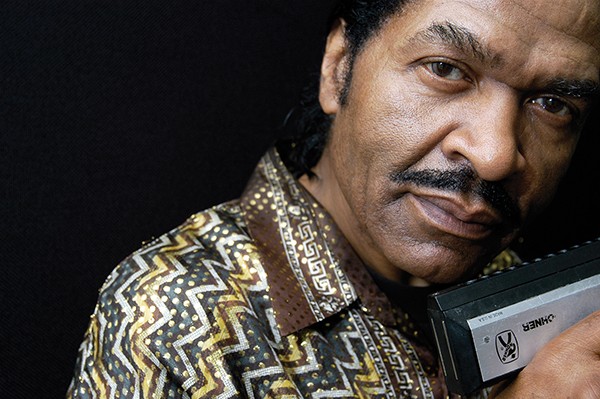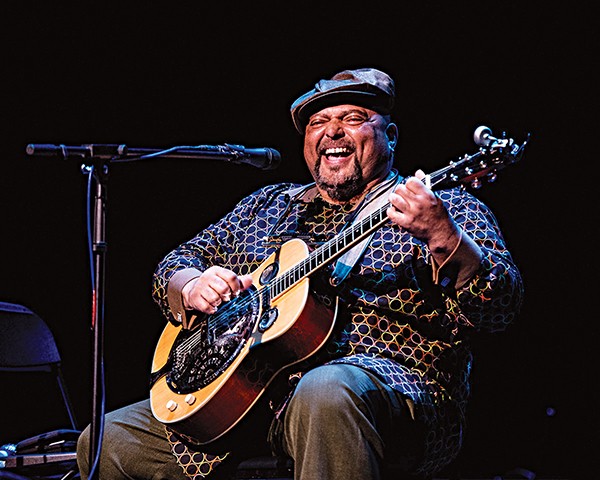The Blues Music Awards (BMAs) are typically a centerpiece of sorts for the Blues Foundation. “This is the highlight of our year, where we share the very best in blues,” says Barbara Newman, president and CEO of the nonprofit. And it’s the highlight for many a blues performer, not to mention others in the industry. With the need for social distancing scuttling the gala event, creative measures had to be adopted. While many festivals have postponed or canceled proceedings, the BMAs will do neither, instead hosting an online event this coming Sunday, May 3rd, at 4 pm.
“We could have created a show with a payment portal, but it was more important to us that the entire community around the world be able to celebrate the music together,” says Newman. “Blues provides such a strong healing force for people, and we felt it was way more important for the Blues Foundation to make this gift to everybody, to watch for free wherever you live.”

Bobby Rush
And make no mistake, the foundation takes that last part very seriously. “Our goal this year is to create a global community from all corners of the world, coming together to celebrate the music and heal our souls,” Newman says. “We’ve timed the show so it will be late in the evening in Europe, or early in the morning in New Zealand or Australia, not at 2 or 3 a.m.”
Even with the traditional live events, the performers have usually been kept secret until the show itself, and that will hold true for the online awards this year. “We gotta have some surprise factor,” says Newman. “But I can tell you who our presenters are. Fantastic Negrito, Ruthie Foster, William Bell, Charlie Musselwhite, Beth Hart, Shemekia Copeland, Warren Haynes, and Keb’ Mo’ will be on camera to share the names of the nominees and the winners. Shemekia is hosting the show from her living room. Artists are sending us footage of themselves performing at home. And we’ve got a whole bunch of surprises that I can’t really share. But I encourage people to watch. They’re not gonna be disappointed.”
According to Newman, many blues fans are making the most of it. “People are creating watch parties, where they watch together while they Zoom, or have a cocktail party beforehand. A lot of people are going to be dressing up in their usual black-tie attire.” But even as the good times roll on, Newman has an even higher priority.
“The COVID-19 Blues Musician Emergency Relief Fund is the biggest initiative that we’re working on right now. The BMAs are important, but right now everybody is very focused on what’s happening in the music community — with festivals and clubs closing or postponing or canceling their events. So the fund has already helped close to 100 musicians. And we’re continuing to bring in more resources to keep on covering housing or utility bills for blues musicians who really don’t have any income stream right now. And with musicians not being able to perform, that trickles down to the rest of the industry, impacting the managers, the clubs, the festivals, the agents, the labels, the publicists, the studios. All of their income streams are being cut as well.
“Some people donate directly. And we’ve gotten tens of thousands of dollars just through ticket holders waiving their refund and donating that amount to our relief fund. Granted, we understand and respect that a lot of people who come to the music awards are also being impacted by COVID-19, and we honor refunds, no questions asked. A few have chosen to just hold their ticket purchases till next year.”
While the pandemic has recently taken the lives of several legendary musicians, luminaries of the blues world have mostly been spared thus far. Many have closely followed the Facebook page of Rev. John Wilkins, who had developed acute pneumonia, possibly due to coronavirus, but it was announced on Thursday that he was “off the ventilator and breathing on his own. He still has a long road to recovery, but is getting a little stronger day by day.”
Bobby Rush, who is nominated in the BMAs’ Best Soul Blues Album category, also took ill recently, but announced last week that his doctor “gave me the green light and good report. I’m well and up in spirit, physically and in mind.” Thanking his fans for their support, Rush added, “Stay in and sanitize … because it saves lives.”
The Blues Music Awards take place Sunday, May 3rd, at 4 p.m. CDT, on the Blues Foundation’s Facebook and YouTube pages. blues.org
 Roger Stephenson
Roger Stephenson